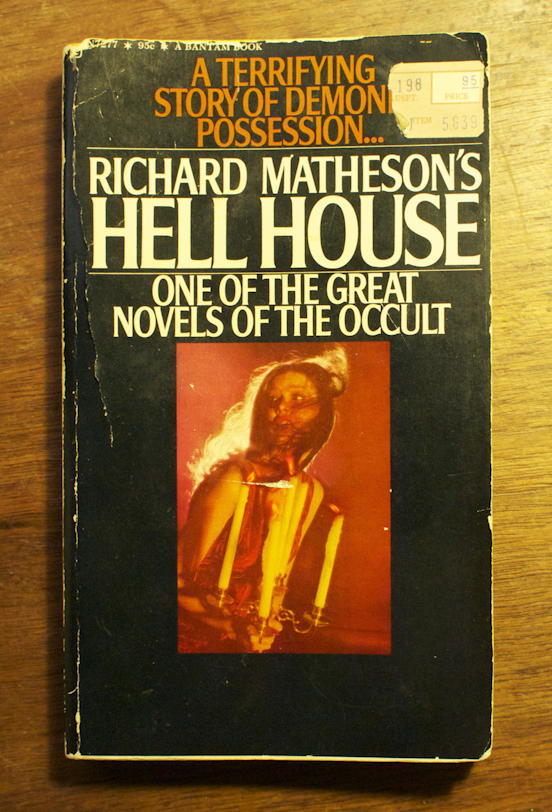Hell House
I almost gave up on finding Hell House• as a book. I wanted to get it in mass-market paperback size so that I could carry it with me; the Legend of Hell House• movie didn’t make me think it was going to be up to the level of something I’d make time to read at home. Finally, my girlfriend tracked down a copy this year and gave it to me for my birthday!
I’m not going to say much about the book specifically; it’s one you’ll want to read to get the surprises from. There are definitely surprises if you’ve seen the movie: it’s very different, especially toward the end.
The “be-metered metal box” makes a bit more sense in the book, and in fact how it works plays a major part in the ending.
This is still a variation on Shirley Jackson’s• The Haunting of Hill House•. It’s the same basic story: parapsychology researcher enters a notoriously-haunted house with a team of psychics. In this case, however, the psychics were not chosen by him, and he would have preferred to bring in psychics he’s more familiar with. But a rich, dying man has chosen his team—and him—and is calling the shots.
He wants proof of life after death, because he’s going to die.
None of the team particularly respect each other’s talents; they each tend to disbelieve the other. But, while Matheson tells the story from everyone’s perspective, shifting from the scientist to the psychics to the scientist’s wife and back, the scientist’s perspective is privileged. The chapter headings are dates and times, as they might be entered in a journal.
When they hold a séance, Barrett, the scientist, measures the medium’s pulse, her respiration, the temperature of the room, and four electrical contacts between the medium’s body parts and the table, to know if she’s trying sleight-of-hand. He has a pressurometer and a dynanometer and “a dark blue instrument” that measures electromagnetic radiation. Each of the devices automatically records its readings, but he also manually dictates their values regularly into a tape recorder.
I would not call this “one of the great novels of the occult” as the cover proclaims; but it is definitely a mirror of its times, when parapsychology was beginning to be taken seriously for a short period of time. Barrett could just as well have been my faculty advisor at Cornell, a physicist who went into psychology and then searched for ways to create measurable, replicable parapsychology experiments.
The interesting aspect to me is that the book (and the movie, which becomes more understandable having read the book) takes one of the tropes of science-fiction, the untested machine that saves the characters at the end, and twists it a bit, brings it a little more in tune with what’s really likely to happen. It’s an arrogance, and a profound misunderstanding, that measurements are theory; they’re not. Doctor Barrett understood his measurements precisely; but his theory was fatally flawed.
Beyond that I cannot go, ere the ending be told too soon. Buy the book•.
In response to Horror Houses: What to do when your house hates you? These movies will help you relate.
- The Haunting of Hill House•: Shirley Jackson (paperback)
- Hill House has become the prototypical haunted house, and yet the original is still the most beautiful.
- Hell House•: Richard Matheson (paperback)
- The original novel, Hell House, is better as both a haunted house story and a psychological horror story than the movie was; the bland science of the movie, while it doesn’t make much more sense, is less bland and plays a bigger part in the book.
- The Legend of Hell House• (DVD)
- A weird sci-fi-horror, fun, but not up to the quality of its ancestor.
More horror
- Dead By Dawn
- Ash is unable to escape after his first night, and ends up spending another night in the cabin in the woods... along with a strange archaeologist’s daughter. Sam Raimi makes another funny gorefest.
- The Evil Dead
- A true “cult classic” that involves beginning actors, a student director, and even a student producer. Director Sam Raimi later went on to do a few more Evil Deads as well as a number of other movies such as “A Simple Plan”.
- Scream
- Wow! I just saw all three “Scream” movies back to back. I watched Scream on DVD in the morning, Scream 2 on DVD in the afternoon, and Scream 3 at the movies. They hang together pretty well. This first of the Screams is designed as a montage-like homage to horror movies of the past in an attempt to both go beyond them and go back to basics. If you’re a horror movie fan, especially movies like “Halloween” and “Nightmare on Elm Street”, you’ll probably like this movie.
- A Nightmare on Elm Street
- One of the best horror movies of my generation, up there with “Halloween” in influence, if not in execution, and seemingly heavily influenced by it.
- Halloween
- The first really good screamer flick I saw. Jamie Lee Curtis kicks butt! I’ve got this one on order. Note that the unlimited edition is less expensive, and doesn’t include the television presentation and its extra footage. It does contain most of the other extras, if not all of them.
- One more page with the topic horror, and other related pages

